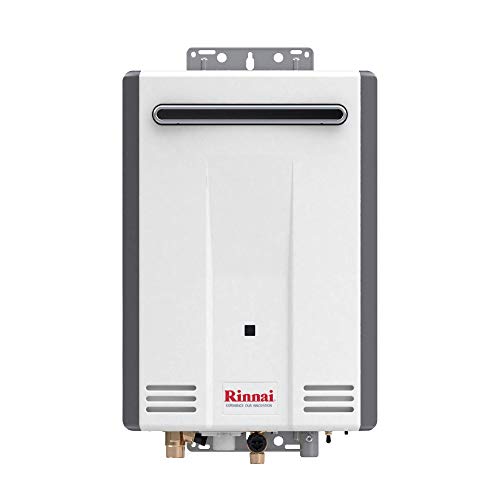Rinnai Tankless Water Heater Size Calculator
Find the perfect Rinnai tankless water heater for your home by entering your details below.
List of the Best Rinnai Tankless Water Heater:
Understanding Rinnai Tankless Water Heater Sizing
Rinnai tankless water heaters provide endless hot water on demand. Proper sizing ensures optimal performance and efficiency. The right size depends on several factors including groundwater temperature, desired hot water temperature, and simultaneous hot water usage.
Rinnai Tankless Water Heater Models
| Series | Max GPM | BTU Input | Best For |
|---|---|---|---|
| RU Series | 11.2 GPM | 199,000 BTU | Large homes, luxury applications |
| RU Compact | 7.5 GPM | 160,000 BTU | Medium homes, moderate usage |
| V Series | 9.8 GPM | 199,000 BTU | Large homes, high demand |
| RL Series | 7.5 GPM | 140,000 BTU | Small to medium homes |
How Rinnai Tankless Water Heaters Work
Rinnai tankless water heaters operate through an efficient on-demand process:
- Water Flow Detection: Sensors detect when hot water is needed
- Heat Exchanger Activation: Gas burner heats the heat exchanger
- Temperature Control: Advanced controls maintain precise temperature
- Continuous Monitoring: Flow and temperature are constantly adjusted
Key Sizing Factors
1. Flow Rate Requirements
| Fixture | Typical Flow Rate (GPM) | Temperature Need |
|---|---|---|
| Shower | 1.5-2.0 | 104°F |
| Bathtub | 4.0-4.5 | 106°F |
| Dishwasher | 1.5 | 120°F |
| Kitchen Sink | 1.5 | 110°F |
2. Temperature Rise Calculation
Temperature rise is critical for proper sizing:
- Temperature Rise = Desired Output Temperature - Groundwater Temperature
- Larger temperature rise requires more powerful unit
- Regional groundwater temperatures vary significantly
- Higher flow rates reduce maximum temperature rise capability
Installation Requirements
Venting Options
- Concentric Venting: Single penetration through wall/roof
- Twin Pipe PVC: Separate intake and exhaust
- Room Air: Uses indoor air for combustion
- Maximum Vent Length: Varies by model and configuration
Gas Line Requirements
- Natural Gas: 3/4" minimum line size typically required
- Propane: Proper tank sizing for BTU demand
- Gas Pressure: Must meet manufacturer specifications
- Professional Sizing: Required for gas line calculations
Energy Efficiency Features
- Condensing Technology: Up to 0.96 Energy Factor
- Modulating Gas Valve: Matches output to demand
- Electronic Controls: Precise temperature management
- Scale Detection: Maintains efficiency over time
Cost Considerations
Initial Investment
- Unit Cost: $800-$2,000 depending on model
- Installation: $1,000-$2,500 professional installation
- Venting: $300-$600 for materials
- Gas Line: $200-$800 if upgrades needed
Operating Costs
- Energy Usage: 30-50% savings vs. traditional tanks
- Maintenance: Annual service recommended
- Lifespan: 20+ years with proper maintenance
- Parts Warranty: 12-15 years on heat exchanger
Frequently Asked Questions
What is the maximum number of fixtures a Rinnai tankless can handle?
Capacity depends on model and conditions:
- Large units (199,000 BTU): 4-5 fixtures simultaneously
- Medium units (160,000 BTU): 3-4 fixtures simultaneously
- Compact units (140,000 BTU): 2-3 fixtures simultaneously
- Actual performance depends on groundwater temperature
Do I need a water softener with my Rinnai tankless?
Water treatment recommendations:
- Required if water hardness exceeds 7 grains
- Extends heat exchanger life
- Maintains maximum efficiency
- Reduces maintenance frequency
What maintenance does a Rinnai tankless need?
Regular maintenance includes:
- Annual professional inspection
- Scale flush every 1-2 years
- Inlet filter cleaning
- Venting system inspection
Can I install a Rinnai tankless water heater myself?
Professional installation is required because:
- Proper gas line sizing is critical
- Venting must meet code requirements
- Warranty requires professional installation
- Special tools and training needed
How long do Rinnai tankless water heaters last?
Lifespan factors include:
- 20+ years with proper maintenance
- Water quality impacts longevity
- Annual maintenance recommended
- Commercial grade components





